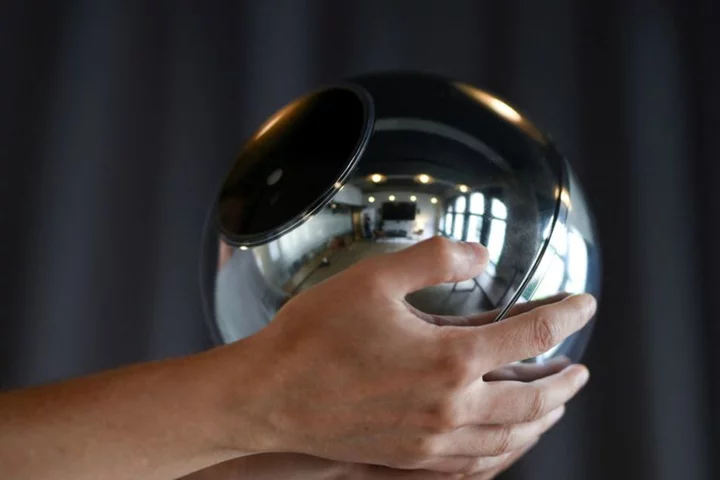
Carbon Pricing Is Key to Delivering Global Emissions Cuts, IMF Says
Higher temperatures and more intense storms haven’t changed the fundamental challenge of climate policy: Countries around the world
2023-10-02 22:52

Water Plants Turn Salty Due to Low Mississippi: Weather Watch
The drought that has led to low levels along the Mississippi River is now threatening the quality of
2023-10-02 22:52

Adults over 65 admit they’re baffled by digital terms including ‘smartphone’
Do you know your phishing from malware? One in six older adults admit they are completely “baffled” by digital terms. A study of 2,000 over-65s found the likes of hyperlinks, phishing and “The Cloud” are among the jargon which leaves people scratching their heads. Processor, malware and USB-C also made the top 20 list of confusing terms - with cookies, IP addresses and smishing also featuring highly. It also emerged 11 per cent think digital terms are so complicated that a foreign language would be easier to learn. To help older people get a better understanding of online jargon, BT Group has partnered with AbilityNet and lexicographer Susie Dent, to create a Digital Dictionary consisting of the 21 most commonly misunderstood words used on the internet. Susie said: “Whilst so much of modern life seems easier online – whether that’s booking a doctor’s appointment, managing your finances, or doing the weekly shop – we’re forgetting one crucial thing: it’s only easier if you understand the language the web is built on. “So, it’s great that this Digital Dictionary is a guide that simplifies the language.” The survey also found the over-65s spend just five and a half hours a week online, with 78 per cent feeling left behind by their lack of knowledge. Just over half (54 per cent) wish they were more knowledgeable when it comes to computing, but 17 per cent of these feel a lack of motivation. Other issues include feeling there is simply too much to learn or needing someone to show them what to do. But 16 per cent worry others will see them as a burden if they ask for help understanding different areas of technology. The main feeling for people who struggle with online jargon is frustration, though others feel silly, or stupid. And while easy access to information (31 per cent), convenience (17 per cent) and keeping in touch with friends and family (15 per cent) were deemed good things about the online world, many had negative things to say. A third (34 per cent) say their least-liked thing about being online is scams, with 14 per cent having privacy concerns. One in 10 (10 per cent) also stress that not every piece of information they see online is credible, according to the OnePoll.com figures. Victoria Johnson, spokesperson for BT Group added: “As younger generations grow up with the internet, it gets even harder for older generations to understand ever-changing online jargon. “But for anyone who isn’t a digital native and didn’t grow up with smartphones or super-fast broadband, it can feel like a whole new world to some. “It’s a shame to see from the research that older adults feel they are a burden when asking for help navigating their way online. “We want to create a more inclusive society by helping them make the most of life in the digital world. “We hope that the variety of online guides will give people the confidence to start exploring the internet and will give them all the training and support needed to live life to the full in the digital age.” The Jargon over 65s don’t understand: 1. Smishing 2. Vishing 3. Hyperlink 4. USB-C 5. Ransomware 6. URL 7. Phishing 8. QR code 9. Cloud 10. Malware 11. IP address 12. Cookies 13. Streaming 14. Tabs 15. Processor 16. Spam 17. Antivirus 18. Hardware 19. Browser 20. Upload 21. USB 22. Social media 23. Emoji 24. Webpage 25. App 26. Google 27. Download 28. Search Engine 29. Software 30. Smartphone Read More Brits think investing is for the super-rich, poll finds Brits get itchy feet in their home after five years, study finds The AI scams that are targeting young adults Elon Musk to live stream himself gaming on X in ‘everything app’ bid Japan startup unveils 15-foot robot suit for space exploration Apple blames Instagram for overheating iPhones
2023-10-02 22:49

Scientists have discovered a disturbing link between milk tea and depression
Bad news for milk tea drinkers, as the beverage - which comes in different forms such as bubble tea - has some disturbing links to depression, according to a new study. Milk tea is widely consumed worldwide, but it has become particularly popular among young people in China over recent years. While many of us buy the drink as a sweet treat or pick-me-up, researchers from Tsinghua University and the Central University of Finance and Economics in China investigated whether milk tea addiction is a thing. After 5,281 university students in Beijing were surveyed as part of the research published in the Journal of Affective Disorders, they found that milk tea addiction does exist and also spotted connections between this issue with anxiety and depression. Researchers noted the "tremendous growth" the beverage has had with youth as well as their findings from the study. "Our findings highlighted that milk tea consumption might lead to addiction, and it is associated with depression, anxiety, and suicidal ideation," they wrote in the paper. Nearly half of the students surveyed said they had at least one cup of milk tea on a weekly basis, while a scale of addiction was used to understand the symptoms such as cravings, immoderation and how this affects daily life. Given that milk tea includes both caffeine and extra sugar, the effects of these ingredients cause worry - with low moods and social isolation as examples. "The results indicate that milk tea consumption might lead to addiction symptoms, including frequency, dependence/craving, intention to stop, unable to stop, tolerance, and guilty feelings," the paper read. Milk tea addiction has been compared to social media and drugs in terms of how damaging it can be, particularly when used to try and regulate emotions. However, a large study would be needed over a longer period of time to gain further understanding of this. To conclude, researchers want further regulation and safeguarding against both the physical and mental symptoms possibly connected to drinking milk tea, for example addiction, depression and obesity. "Current findings can assist policymakers in developing regulations such as restricting advertising, providing psycho-education, establishing food hygiene standards for such a prosperous youth-dominant consumption industry while protecting their mental health," they stated. Sign up to our free Indy100 weekly newsletter Have your say in our news democracy. Click the upvote icon at the top of the page to help raise this article through the indy100 rankings.
2023-10-02 22:28

How to Pre-Register Mortal Kombat: Onslaught
Here's how players can pre-register for Mortal Kombat: Onslaught through Apple, Android, and PC.
2023-10-02 22:27

Microsoft CEO calls Google mobile search argument 'bogus'
By Diane Bartz WASHINGTON Microsoft chief executive Satya Nadella on Monday took the witness stand in the U.S.
2023-10-02 22:23

Kenya panel urges shutdown of Worldcoin's crypto project within country
By Duncan Miriri NAIROBI A Kenyan parliamentary panel called on the country's information technology regulator on Monday to
2023-10-02 21:54

Main South Africa Power Union Calls to Suspend Climate Finance Pact
The main labor union at South Africa’s state power utility called for the suspension of an $8.5 billion
2023-10-02 21:47

Tesla misses estimates for quarterly deliveries; shares fall
(Drops extraneous word from headline) (Reuters) -Tesla missed market estimates for third-quarter deliveries on Monday as the automaker was forced
2023-10-02 21:23

Elon Musk to live stream himself gaming on X in ‘everything app’ bid
Elon Musk has said he will live stream himself playing video games on X on Monday night as part of his goal of transforming the social media platform into an “everything app”. The tech billionaire previously tried to launch a gaming stream last week but ran into technical issues. “Tested the X video game streamer last night,” he posted on X on Monday. “It works!” The SpaceX and Tesla boss added that he would “try to complete a Tier 100 Nightmare dungeon” on Tuesday night during a live stream on X. Since taking over Twitter in October 2022, and renaming it to X in April 2023, Mr Musk has repeatedly stated his ambition to transform the social media platform into an “everything app”, starting by taking on streaming giants Twitch and YouTube. Similar to China’s WeChat, the app could eventually incorporate other functions and services like making payments, booking taxis or ordering food. Mr Musk has already secured money-transmitting licences in at least three US states, and has a history of building online payments platforms after co-founding PayPal. X chief executive Linda Yaccarino, who Mr Musk hired in June, laid out what this new version of the app might look like in a series of posts after joining the company. “X is the future state of unlimited interactivity – centred in audio, video, messaging, payments/banking – creating a global marketplace for ideas, goods, services, and opportunities. Powered by AI, X will connect us all in ways we’re just beginning to imagine,” she wrote. “For years, fans and critics alike have pushed Twitter to dream bigger, to innovate faster, and to fulfil our great potential. X will do that and more. We’ve already started to see X take shape over the past 8 months through our rapid feature launches, but we’re just getting started.” Before Mr Musk took over, Twitter had a video streaming feature called Periscope that was shut down in March 2021 due to declining usage. Mr Musk briefly tested the dormant feature in May 2023, though users dubbed him “8-bit Elon” due to the low quality resolution of the broadcast. Read More Elon Musk and the one trillion-dollar algorithm that explains everything he does Musk confirms he is cutting election integrity staff from X/Twitter ahead of 2024 Reddit will start paying people to post Tesla robot shown practising yoga
2023-10-02 20:59

Japan startup unveils 15-foot robot suit for space exploration
Engineers in Japan have created a 3.5-ton robot suit that resembles a character from a hugely popular animation series, which they hope to use for space exploration and in emergency situations. Tokyo-based start-up Tsubame Industries developed the 4.5-metre-tall (14.8-feet), four-wheeled Archax robot that looks like “Mobile Suit Gundam” from the 1970s Japanese show of the same name. Named after the avian dinosaur archaeopteryx, the $3 million (£2.5m) robot has cockpit monitors that receive images from cameras hooked up to the exterior so that the pilot can manoeuvre the arms and hands with joysticks from inside its torso. The robot, which will be unveiled at the Japan Mobility Show later this month, has two modes: the upright ‘robot mode’ and a ‘vehicle mode’ in which it can travel up to 10 km (6 miles) per hour. “Japan is very good at animation, games, robots and automobiles so I thought it would be great if I could create a product that compressed all these elements into one,” said Ryo Yoshida, the 25-year-old chief executive of Tsubame Industries. “I wanted to create something that says, ‘This is Japan’.” Mr Yoshida plans to build and sell five of the machines for the well-heeled robot fan, but hopes the robot could one day be used for disaster relief or in the space industry. Mr Yoshida became interested in manufacturing at an early age, learning how to weld at his grandfather’s ironworks and then going on to found a company that produces myoelectric prosthetic hands. He said he is eager to keep Japan’s competitive edge in manufacturing alive. “I hope to learn from previous generations and carry on the tradition,” he said. Tsubame Industries is one of several startups working on robotic exoskeletons, with applications ranging from assisting delivery workers with heavy loads, to military “super soldier” suits. The US military has already unveiled several exoskeleton prototypes, with one such device claiming to offer Marines the strength and ability of up to 10 troops. “The ultimate goal is to provide troops with an edge by boosting their capabilities and dramatically improving safety and productivity in a variety of logistics applications,” the company behind it, Sarcos Robotics, said in 2020. Additional reporting from agencies. Read More MIT invents self-replicating AI robots TikTok finds and shuts down secret operation to stir up conflict in Ireland Apple blames Instagram for overheating iPhones Royal website subject to ‘denial of service attack’, royal source says
2023-10-02 19:59

Ireland Makes Rare Decision to Deny LNG Port for Climate Reasons
Amid Europe’s angst over energy security, Ireland has made one of the boldest moves of any nation on
2023-10-02 19:55
